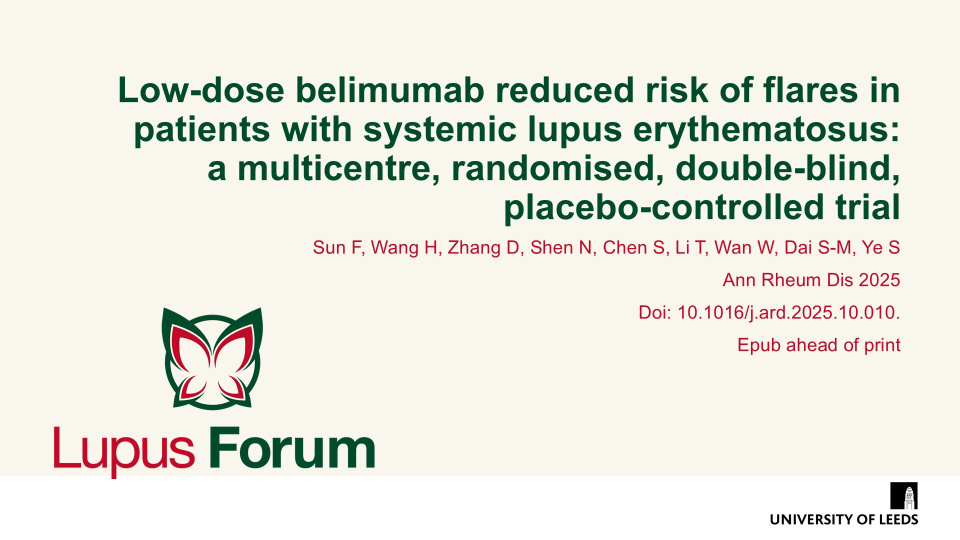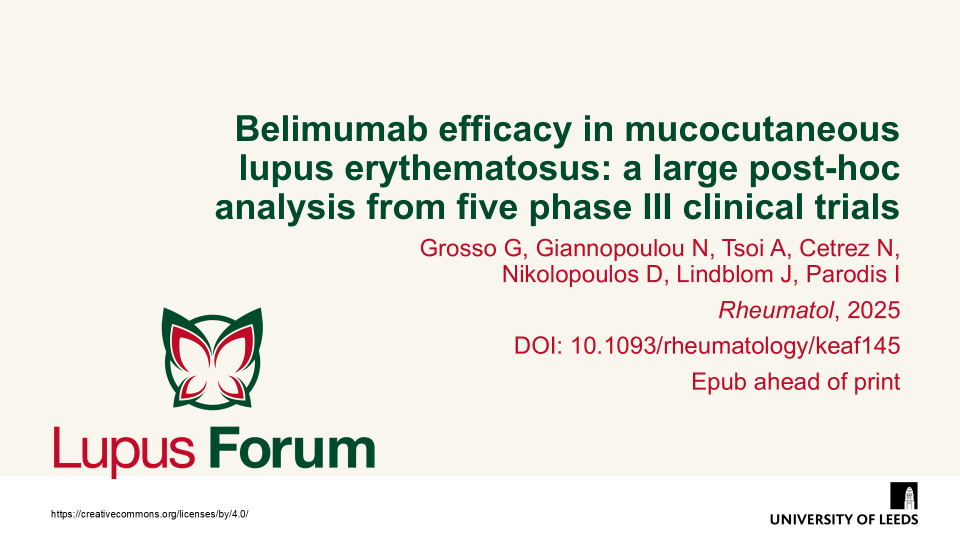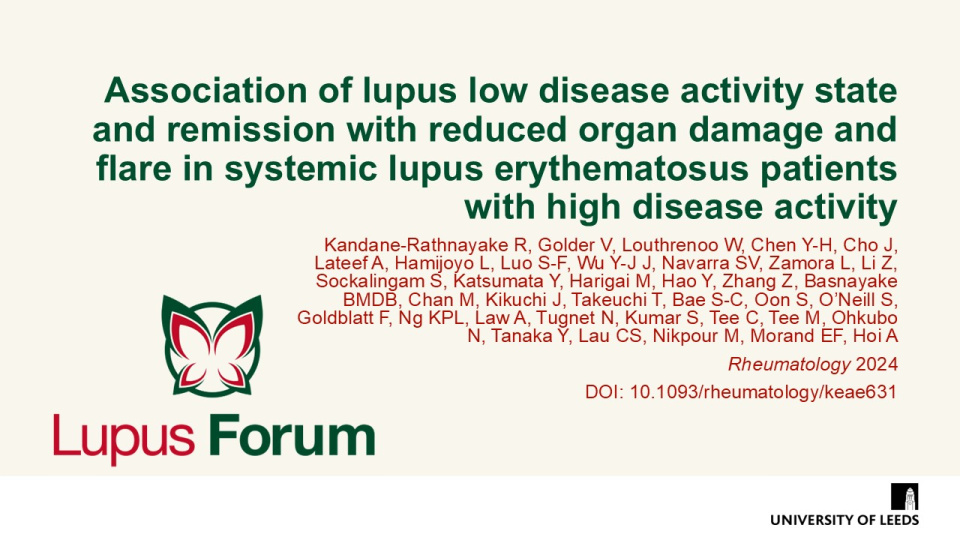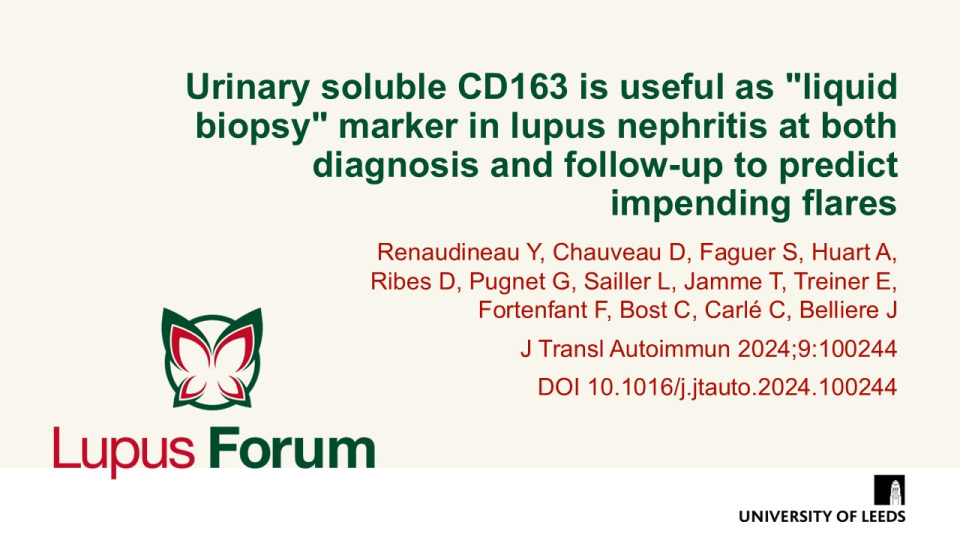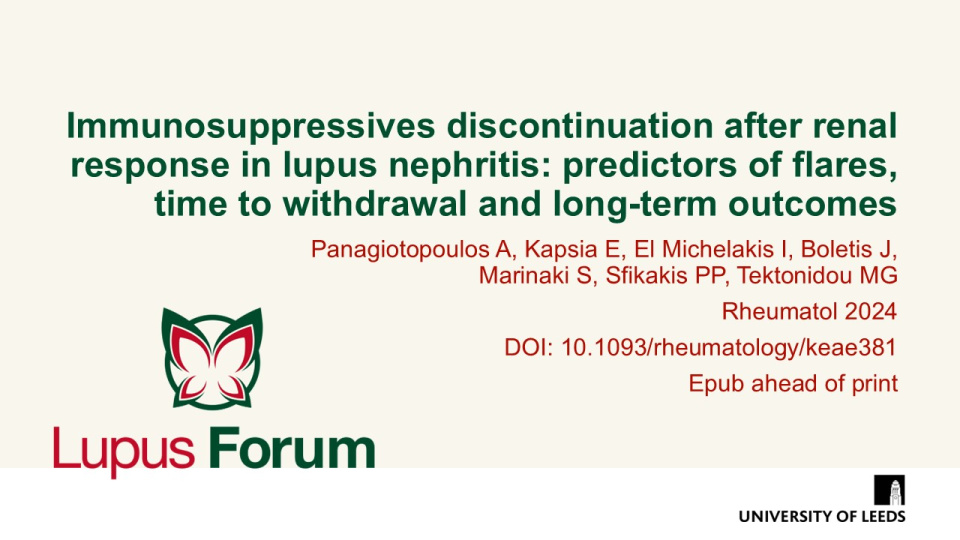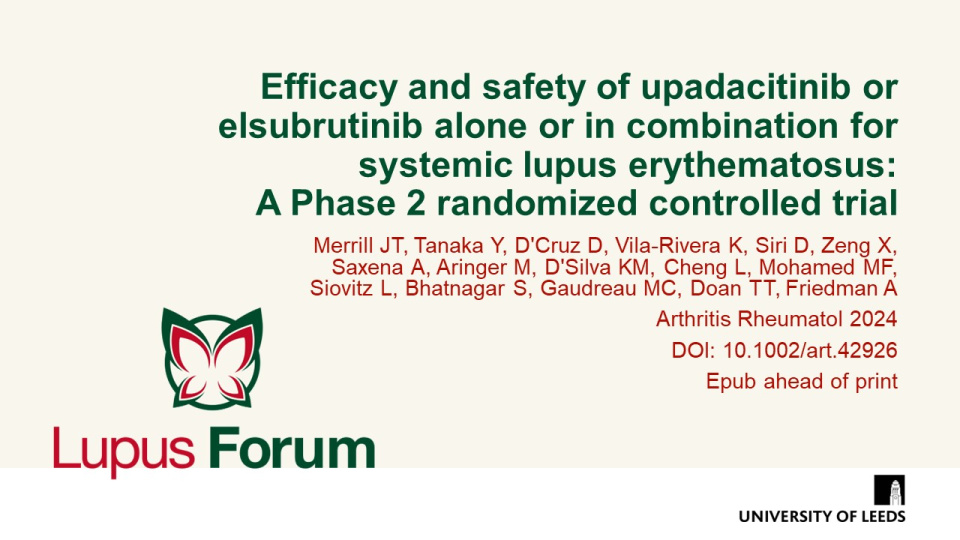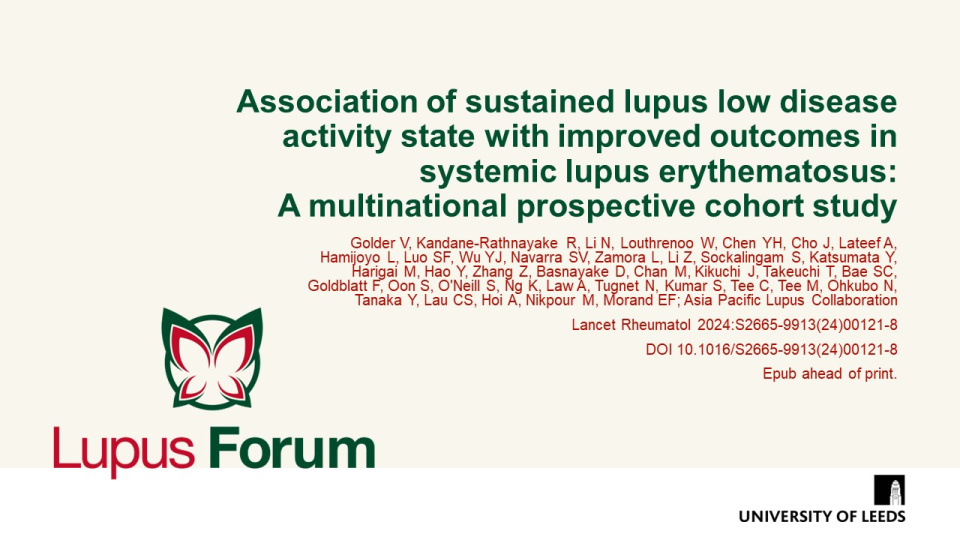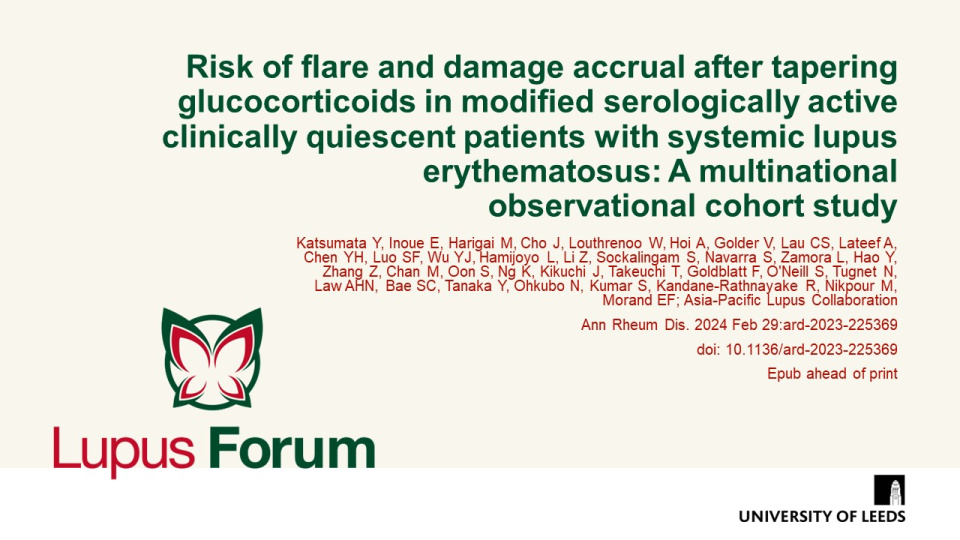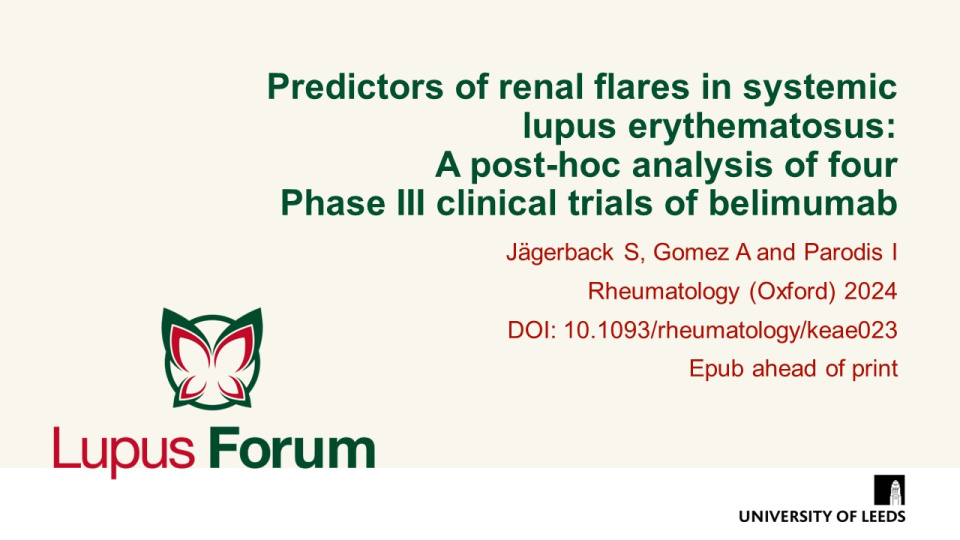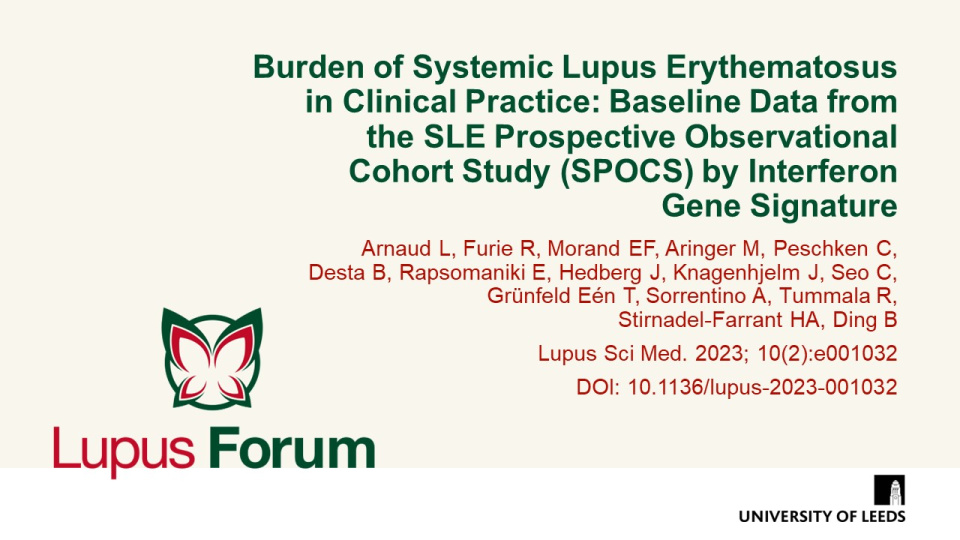Publications
Find coverage of the latest original articles on Lupus, focusing on those with data on therapeutic interventions and those that have clinical impact.
Low-dose belimumab reduced risk of flares in patients with systemic lupus erythematosus: A multicentre, randomised, double-blind, placebo-controlled trial
Ann Rheum Dis 2025 Doi: 10.1016/j.ard.2025.10.010. Epub ahead of print
Sun et al. provides the first RCT evidence that low-dose belimumab reduces flares in patients with SLE with low-grade disease activity. Authors evaluated the efficacy of low-dose belimumab for disease flare prevention in Chinese patients with low-grade SLE (SELENA-SLEDAI ≤6).
Keywords:
Belimumab efficacy in mucocutaneous lupus erythematosus: a large post-hoc analysis from five phase III clinical trials
Rheumatol, 2025. Epub ahead of print. DOI: 10.1093/rheumatology/keaf145
Grosso et al. conducted a post-hoc analysis of five phase III trials, including 3086 patients, to evaluate the efficacy of belimumab in improving mucocutaneous manifestations of SLE. The results demonstrated that belimumab significantly improved disease activity as measured by the mcBILAG and mcSLEDAI-2K indices compared with placebo and reduced flare rates in patients with high disease activity and serological positivity.
Keywords:
Association of lupus low disease activity state and remission with reduced organ damage and flare in systemic lupus erythematosus patients with high disease activity
Rheumatology 2024; Epub ahead of print DOI: 10.1093/rheumatology/keae631
Kandane-Rathnayake et al. demonstrated that achieving Lupus Low Disease Activity State (LLDAS) or remission in patients with high disease activity status (HDAS) significantly reduces the risk of organ damage accrual and flares. However, HDAS was found to be a poor prognostic indicator as fewer patients with HDAS attained and sustained LLDAS or remission when compared with non-HDAS patients.
Keywords:
Urinary soluble CD163 is useful as "liquid biopsy" marker in lupus nephritis at both diagnosis and follow-up to predict impending flares
J Transl Autoimmun 2024;9:100244 DOI 10.1016/j.jtauto.2024.100244
Renaudineau, et al. show that the urinary sCD163/creatinurea ratio is a parameter than can be used in addition to anti-dsDNA antibodies, anti-C1q antibodies, C3 complement fraction, the protein excretion to creatinine ratio and the estimated glomerular filtration rate.
Keywords:
Immunosuppressives discontinuation after renal response in lupus nephritis: predictors of flares, time to withdrawal and long-term outcomes
Rheumatol 2024 DOI 10.1093/rheumatology/keae381 Epub ahead of print
This study by Panagiotopoulos, et al. showed that an early complete renal response achievement, persistent hydroxychloroquine use, and the maintenance of optimal low disease activity during follow-up in immunosuppressive (IS) tapering and discontinuation are fundamental in LN treatment. The authors also found that long-term renal outcomes are mainly associated with renal flares during IS tapering.
Efficacy and safety of upadacitinib or elsubrutinib alone or in combination for systemic lupus erythematosus: A Phase 2 randomized controlled trial
Arthritis Rheumatol 2024 DOI: 10.1002/art.42926 Epub ahead of print
Daily oral upadacitinib 30 mg and ABBV-599 high dose (elsubrutinib 60 mg QD + upadacitinib 30 mg) were effective in multiple outcome measures including disease activity, flares, time to first flare, and joint counts.
Keywords:
Association of sustained lupus low disease activity state with improved outcomes in systemic lupus erythematosus: a multinational prospective cohort study
Lancet Rheumatol 2024:S2665-9913(24)00121-8 DOI 10.1016/S2665-9913(24)00121-8 Epub ahead of print
This study by Golder, et al. showed a significant protective association of lupus low disease activity state (LLDAS) and remission against damage accrual and flare. The authors also found a threshold of 3 months sustained LLDAS or remission, and that 3 months of sustained LLDAS are attainable in the setting of a 6–12-month clinical trial.
Keywords:
Risk of flare and damage accrual after tapering glucocorticoids in modified serologically active clinically quiescent patients with systemic lupus erythematosus: A multinational observational cohort study
Ann Rheum Dis. 2024 Feb 29:ard-2023-225369 doi: 10.1136/ard-2023-225369 Epub ahead of print
Flare risk did not increase following glucocorticoid tapering in modified serologically active clinically quiescent patients with SLE. They also found that antimalarial use was associated with decreased flare risk.
Predictors of Renal Flares in Systemic Lupus Erythematosus: A Post-hoc Analysis of Four Phase III Clinical Trials of Belimumab
Rheumatology (Oxford) 2024 DOI: 10.1093/rheumatology/keae023 Epub ahead of print
High baseline proteinuria levels, hypoalbuminaemia, and C3 consumption were associated with
renal flare development. Renal flares remain common in patients with SLE, however causative factors are still largely unknown. Jagerback, et al. conducted a post-hoc analysis of pooled BLISS trial data to identify predictors of renal flares.
Keywords:
Burden of Systemic Lupus Erythematosus in Clinical Practice: Baseline Data from the SLE Prospective Observational Cohort Study (SPOCS) by Interferon Gene Signature
Lupus Sci Med. 2023; 10(2):e001032 DOI: 10.1136/lupus-2023-001032
This study from Arnaud et al described baseline characteristics of SLE patients grouped by disease activity and IFNGS category in the international SPOCS study. IFNGS-high patients were younger at SLE diagnosis, and a baseline SLEDAI-2K score ≥10 was associated with shorter disease duration, more frequent and more severe flares. IFNGS-low patients were more likely to exhibit musculoskeletal and CNS comorbidities than IFNGS-high patients. Continuation of the SPOCS study will allow investigation into how different baseline characteristics affect long-term outcomes in SLE patients.


